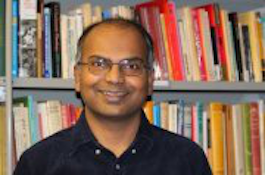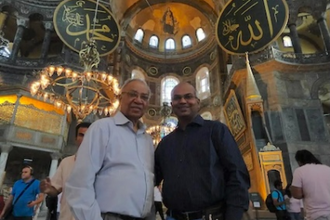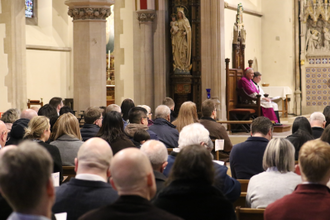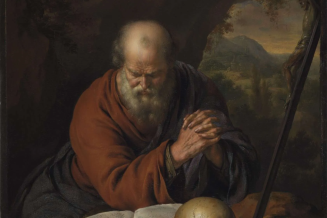Winter reflection on Christian-Muslim relations

Fr Victor Edwin SJ
Fr Victor Edwin SJ, writes:
I spent Christmas at a small Jesuit parish in Behror, on the way to the pink Jaipur (India). A day before Christmas, I read the 19th chapter of the Quran and the first chapter of Mathew's Gospel. Something beautiful struck me: how God cares for Mary. In the Quran, we read that Mary gave birth to the child as announced by the angel Gabriel. She is unmarried. She was worried about how she would present the child to the people. It happened exactly like that.
Carrying her child, she brought him to her people. They said, 'O Mary, you have indeed done something terrible! (Q. 19, 27)
Her relatives were furious and accused her of immorality. She gestures towards the child, and the child speaks, defending his mother. A vulnerable child is defending his mother-something very beautiful.
In the Gospel of Mathew, we find Mary pregnant. Joseph, the man whom she was engaged to, was a man of justice and obedient to God. He was very worried about how the woman he was engaged to was pregnant before marriage.
…an angel of the Lord appeared to him in a dream and said, "Joseph, son of David, do not afraid to take Mary as your wife, for the child conceived in her is from the Holy Spirit (Matthew 1:20)
A silent man, Joseph does not speak a word. A silent, obedient person protects the dignity of Mary. From both these narratives one can draw insightful conclusions as we as Muslims and Christians engage in the Quran and the Bible. What does the Word of God tell us in today's context? What does it say to us with regard to protecting the dignity of the poor and vulnerable people?
I wished more Muslims read the Holy Bible and Christians read the Holy Qur'an. Some time ago, while reading medieval commentarial tradition in Islam, I found a heartening reference to Muslim reading the Bible. Al-Biqai (d. 1489 CE) in his great commentary on the Quran, nazm al-durar fi tanasub al-ayat wa l-suwar (String of pearls concerning the harmony of verses and suras) included biblical material. He was criticized for this by his fellow scholars. Al-Biqai argues that reading the Bible is in line with Islamic tradition (ref Walid A Saleh, In Defence of the Bible: A Critical edition and an introduction to al-Baqai's Bible treatise (Leiden: Brill, 2008), 57-191. Al-Biqai uses a long passage from the Book of Jeremiah and comments upon the passage in the following words: "a speech that is sublime in style, exquisite in its tenderness, such that it crushes the livers, renders the hearts, and makes the eyes swell with tears" (ref Walid A Saleh, "'sublime in style, exquisite in its tenderness: The Hebrew Bible Quotations in al-Biqai's Quran commentary," in Adaptations and Innovations: Studies on the interaction between Jewish and Islamic thought and literature from the early Middle Ages to the late twentieth century, Dedicated to Professor Joel L Kramer, eds. Y Tzvi Langermann and Josef Stern (Paris: Peeters, 2007), 331.
Just before Christmas break, a group of third year students of theology presented a seminar on Blessed Charles de Foucauld (who will be canonized soon). This seminar gave me an occasion to re-read one of my favourite books on the Blessed titled: A Christian Hermit in an Islamic World: A Muslim's View of Charles De Foucauld by Ali Merad.
Charles De Foucauld was a pioneering figure in the field of Christian-Muslim relations. As an adolescent, De Foucauld lost his Catholic faith. While taking a risky exploration of Morocco, he witnessed Muslims' devotion to prayer. His heart cried out: "My God, if you exist, let me come to know you." At the age of 28, under the guidance of his spiritual director he rediscovered God. He declared his faith in the following words: "As soon as I believed in God, I understood that I could not do otherwise than to live for him alone."
As an ordained priest he moved to live in Beni Abbès and later at Tamanrasset among Muslims in the Sahara deserts. He wanted to be among those who were, "the furthest removed, the most abandoned." He wanted all who drew close to him to find in him a brother, "a universal brother." In a great respect for the culture and faith of those among whom he lived, his desire was to "shout the Gospel with his life."
The writer Ali Merad observes that for Charles de Foucauld the best Christian witness among Muslims is to seek to imitate Christ. De Foucauld sought to imitate Christ with extraordinary generosity and deep devotion among Muslims in Morocco. Merad notes that for a Muslim, to imitate one's prophet is the most perfect form of living one's faith. As a student of Christian-Muslim Relations, I readily agree with what he says.
Drawing from the Muslim devotion to Muhammad, it should be said that the best way to share the Gospel of Christ with Muslims is to be a living witness to Jesus among them. It is a great challenge to each disciple of Christ, especially those who are called to a lifelong ministry among Muslims. The challenges may be monumental, but I feel deep consolation. There are great models of the past, like Charles de Foucauld, Louis Massignon, and Jacques Jomier to emulate, but also some wonderful contemporary models whom I have met and whose guidance and support I have received-people like Paul Jackson, Chris Hewer and Christian Troll. With much gratitude and love I cannot but surrender myself to the Lord who I believe has called me to live this mission of being a witness among our Muslims brothers and sisters.
In the New Year, a friend of Islamic Studies Association, Prof Alan Brill came visiting me. He is the Cooperman/Ross Endowed Chair for Jewish-Christian Studies and Director of Graduate Studies at Seton Hall University (USA). I invited a Muslim scholar, Khurshid Khan, over for the conversation, and we had a trialogue-a Jew, a Christian and a Muslim-in which we shared about our work and had a meal together.
It is one thing to say that we Christians, Muslims and Jews should come together and work for peace. It is good to hear that. However, I think that it needs deeper reflection than this. I think that trialogue between Muslims, Jews and Christians must be made an occasion to celebrate the most cherished faith convictions and practices. Such conversations provide the context for learning through mutual witness. I think that is the most important thing. And our conversation would be engaging and fruitful if it also brings in situations of conflict into our conversation-issues of land and statehood related to Israel and Palestine and the coexistence of the three sets of believers in Jerusalem. I think it is not enough only to be friends and build a bond of love between one another or only to repent for the past hurts or the past violence against one another and in the present, necessary though these are. It is also not just about listening and learning from one another. The most important thing is that we should find ways to collaborate with God's work of healing, reconciliation and bringing peace. We must collaborate as brothers, sisters and friends. We have an important task in the world today. We must work with all peoples for co-existence, reconciliation, peace and harmony. We really need to work harder together.
I wish you a fruitful and healthy new year 2022.
Joseph Victor Edwin SJ
India.
Fr Victor Edwin is a Jesuit priest who teaches Christian-Muslim Relations at Vidyajyoti, a Catholic centre for higher theological learning in Delhi. He is deeply engaged in seeking to promote understanding and goodwill between Christians and Muslims. He has a PhD in Islamic Studies from Jamia Millia Islamia, New Delhi, and has written widely on issues related to interfaith relations.


















